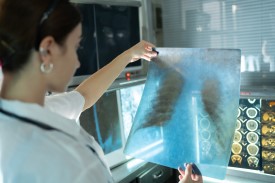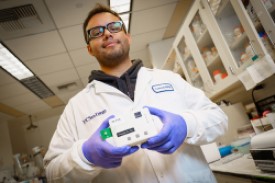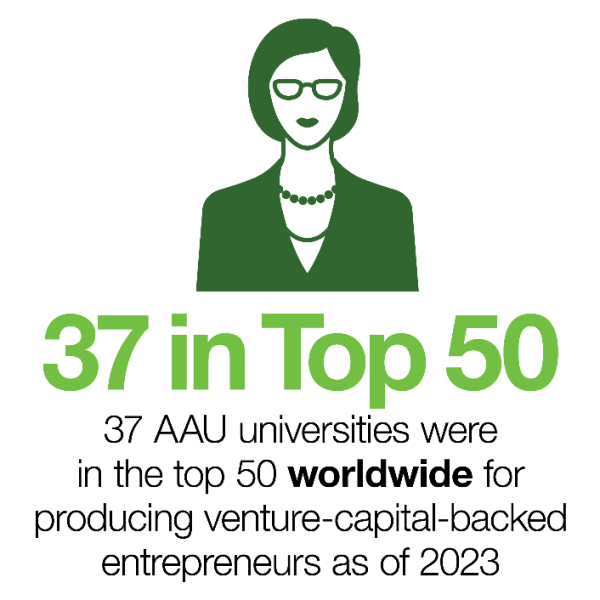 New Report Shows Increasing Demand for College-Educated Workers
New Report Shows Increasing Demand for College-Educated Workers
Georgetown University’s Center on Education and the Workforce (CEW) recently published a report predicting an “increasing need for workers to have greater levels of education in order to succeed in the modern economy” over the next decade.
The report found that “68 percent of all jobs required at least some postsecondary education” in 2021 and estimated that share will increase to 72 percent by 2031, with “42 percent of all jobs [requiring] at least a bachelor’s degree.” This unprecedented increase highlights that “postsecondary education or training has become the threshold requirement for access to the managerial and professional economy and the middle-class status and earnings.”
The report further broke down their predictions by occupation and industry, noting that, in some sectors, the share of jobs requiring post-secondary education will grow at a faster rate than others. They also considered the potential impacts artificial intelligence may have on jobs and education needs, stating their “research shows that automation primarily will eliminate specific tasks within jobs rather than wipe out entire jobs.”
 AAU Leaders Urge Congress to Fund American Science
AAU Leaders Urge Congress to Fund American Science
Four Ohio newspapers have recently published an opinion essay that AAU President Barbara R. Snyder co-wrote with Ohio Chamber of Commerce President and CEO (and former Ohio Congressman) Steve Stivers on why Congress must fund the “science” portion of the CHIPS and Science Act, which was passed and signed into law last year. They submitted the op-ed as part of AAU’s ongoing Fund American Science campaign, which is urging Congress to provide appropriations that meet the goals for research funding set by CHIPS and Science. The op-ed has thus far appeared in The Athens Messenger, the Youngstown Business Journal, the Dayton Daily News, and the Herald-Star in Steubenville.
In the piece, President Snyder and former Rep. Stivers note that, barely a year after the CHIPS and Science Act became law, actual appropriations are already $7 billion behind the research funding levels it authorized – but that competitor nations aren’t standing still. “It’s clear that China and other nations are serious about making investments in critical technologies, STEM infrastructure, and the future workforce,” they wrote. “Xi Jinping has made it clear that retaining and attracting the world’s top STEM talent is one of China’s top national priorities. China also understands that research investments will help them advance their offensive and defensive capabilities. But the unfulfilled promise of CHIPS and Science underscores our competitors’ doubt about whether the United States still has the collective will to remain the world’s unchallenged leader in scientific advancement.”
Other AAU leaders are echoing this important message; Duke University President Vincent Price recently published a piece in the Raleigh, NC News & Observer on the unfulfilled promise of CHIPS and Science. Titled “The CHIPS Act was bold, but time is wasting,” the article noted the $200 billion authorized by the act, but not yet appropriated by Congress. “North Carolina is well positioned to capitalize on this investment, but Congress must prioritize this funding in current and future budget cycles to ensure the U.S. stays ahead in the increasingly competitive race for global leadership in science and innovation,” he wrote.
 Creating a Mutually Beneficial Research Collaboration with Indian Universities
Creating a Mutually Beneficial Research Collaboration with Indian Universities
Recently, the Not Alone: Leaders in Focus newsletter published an article that AAU President Barbara R. Snyder wrote on recent efforts to deepen research ties with Indian universities. The essay focused on the impetus behind the AAU Task Force on Expanding U.S.-India University Partnerships; what the task force has been doing thus far and what it seeks to accomplish; and the recommendations contained in the task force’s interim report to increase scientific cooperation between the United States and India. The article emphasized the overall importance of international collaboration and argued that “we all benefit when science is collaborative, international, open, and inclusive of diverse perspectives.”
Not Alone is edited by Georgia Institute of Technology Professor (and former Provost) Rafael L. Bras and features perspectives on global issues by leaders in academia and research. It has previously published pieces by several AAU member presidents, including University of Maryland President Darryll Pines; University of California, Santa Cruz Chancellor Cynthia Larive; University of California, Davis Chancellor Gary May; Arizona State University President Michael Crow; and Princeton University President Christopher Eisgruber.
National Academies Committee on Effective Undergraduate STEM Teaching Seeks Public Input
As the United States seeks to grow and diversify its STEM (science, technology, engineering, and mathematics) workforce to meet the technological and scientific challenges of the future, AAU has partnered with our members and with outside organizations to find ways to improve undergraduate STEM teaching. The National Academies of Science, Engineering, and Medicine’s Committee on Equitable and Effective Teaching in Undergraduate STEM Education is seeking input on a public draft of a new document that offers seven principles for equitable and effective undergraduate STEM teaching. The committee is inviting feedback on the principles as well as requesting recommendations for policies and practices at the department and institutional level to support these principles. Comments are requested by December 20,2023 and can be submitted through this questionnaire. The final framework and consensus report recommendations will be published in winter 2024.
News of Interest
Forbes: Cryogenic Industries Founder Pledges to Give Nearly All of His More than $400 Million Fortune Away to Caltech – California Polytechnic University alumnus Ross M. Brown has pledged to donate $400 million for the university to establish the Ross Brown Investigators Program that is “designed to support mid-career physics and chemistry professors.” The program will be administered by Caltech, “while an independent review board will choose eight fellows annually from more than a dozen invited universities across the country. Each chosen investigator will receive a $2 million, five-year fellowship.”
Daily Camera: Phil DiStefano: Let’s Rally Behind CU Boulder Researchers – University of Colorado Boulder Chancellor Philip DiStefano turned the spotlight away from football and toward the university’s important academic and research accomplishments in a recent op-ed piece for the Boulder Daily Camera. “From space to climate, health and quantum science and technology, CU Boulder is harnessing a record $684 million in research funding last year to address some of humanity’s toughest challenges,” he wrote.
The Detroit News: Opinion: Research Universities Leading the Way in Sustainable Innovation – In an opinion piece, University of Michigan President Santa J. Ono, Michigan State University Interim President Teresa K. Woodruff, and Wayne State University President Kimberly Andrews Espy explain what the three universities, which comprise the University Research Corridor in Michigan, are doing to fight climate change and achieve sustainability. As research universities, the presidents wrote, their institutions “are uniquely positioned and carry great responsibility to expand our understanding of the crisis through research, developing sustainable solutions through innovation and testing, and fostering change through the education of tomorrow’s leaders.”
The Washington Post: Biden Picks Vanderbilt Physician to Lead National Cancer Institute – On Friday, President Biden named Vanderbilt University Medical Center Chair of Medicine W. Kimryn Rathmell as the next director of the National Cancer Institute, starting in December. In this role, she will “help oversee several White House-backed initiatives intended to reduce cancer deaths and accelerate clinical breakthroughs.”
Featured Research

Researchers Find Potential Way to Tweak Immune System to Help It Fight Tuberculosis
Researchers at Boston University’s National Emerging Infectious Diseases Laboratories have been studying the genetic signatures of immune cells and investigating ways to tweak the cells to better fight tuberculosis. In conjunction with scientists at Ireland’s University College Dublin, they found a specific drug combination protocol that can turn TB-vulnerable immune cells into TB-resistant cells by hindering “cell signals related to inflammation and stress, while also boosting the pathways that carry stress resistance signals.”

This Wireless, Handheld, Non-Invasive Device Detects Alzheimer’s and Parkinson’s Biomarkers
A University of California, San Diego researcher partnered with researchers globally to develop “a handheld, non-invasive device that can detect biomarkers for Alzheimer's and Parkinson's diseases,” ultimately only needing a subject’s saliva or urine. The device relies on the “easier to implement and more accurate” electrical detection, rather than chemical, and can transmit results wirelessly. The device has the potential to be modified to detect other conditions.
From Our Feeds

Of the top 50 universities across the globe that graduate the most entrepreneurs who started businesses with venture capital, nearly three quarters – 37 – are AAU members.